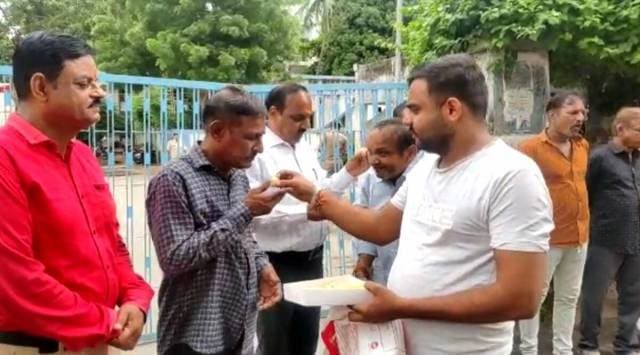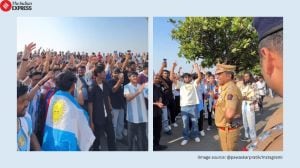House-warming ceremony, son’s wedding, and mother’s knee-replacement surgery — these were among the reasons cited by some of the 11 convicts in the Bilkis Bano case who approached courts seeking parole or temporary bail even as prosecution witnesses wrote to government authorities citing threats from the convicts who took “frequent parole”.
In some instances, however, their pleas for bail were rejected as the courts made note of the parole leaves they “enjoyed” — usually through applications made to the district administration through the authorities at the Godhra sub-jail, where they were lodged.

In April this year, the Gujarat High Court rejected a petition by Radheshyam Shah, one of the 11 convicts, who sought a 28-day parole for his “house-warming ceremony”. Rejecting his plea, Justice A S Supehia said, “Looking at the jail remarks as well as the cause for which the petition is filed, the same is rejected.” The court also noted that Shah had already spent 60 days on parole — from January 29 to March 30 this year.
Earlier, with his appeal against conviction pending before the Bombay High Court, Shah had in 2011 applied for a three-month temporary bail for “his mother’s knee-replacement surgery”. In September 2011, a division bench of Justices V M Kanade and A M Thipsay of the Bombay HC rejected and dismissed his plea, noting that he was “released on furlough in December 2010 and is due to be released on furlough leave in December 2011”.
It was Shah’s petition in the Supreme Court that led to the court directing the Gujarat government in May to consider and grant remission to the 11 convicts based on a 1992 policy that allows for early release of life-term convicts. On August 15, the government of Gujarat, based on the “unanimous” recommendation of the Jail Advisory Committee (JAC) to grant them remission on grounds of “good behaviour’, released all the 11 convicts who had in 2008 been sentenced to life imprisonment in the 2002 case of Bilkis Bano’s gang rape and murder of seven of her family members during the communal riots.
Earlier, in May 2019, co-convict Keshar Vohania’s application, seeking parole for his son’s marriage, had been rejected by Justice Umesh Trivedi of the Gujarat High Court.
Vohania had by then already spent 90 days on parole in the six months between August 2018 and March 2019. Justice Trivedi made note of this as he rejected Vohania’s parole plea, saying since “he has already enjoyed parole leave for 50 days from August 12, 2018 to September 30, 2018, and for 40 days from February 10, 2019 to March 23, 2019, this leave application cannot be entertained”.
Story continues below this ad
Between 2017 and 2020, witnesses and residents of Randhikpur village, to which belonged both the victims and convicts in the Bilkis Bano case, had submitted several memoranda and complaints to the district police as well as to then Gujarat minister of state for Home Pradeepsinh Jadeja, contending that the 11 convicts were “frequently out on parole” and “issuing threats” to the witnesses.
A letter written to Jadeja in February 2021 by Abdul Razzak Mansuri, a resident of Randhikpur, on behalf of the witnesses in the Bilkis Bano case, had said that the accused were “using their time out of jail to attend political events, continue with their businesses, build their bungalows and also threaten witnesses” and that the witnesses were living “in constant fear of the accused, (who) are technically serving their life imprisonment”.
The five-page letter to Jadeja from Mansuri, who has been providing assistance to the witnesses and is among the riot-affected from Randhikpur who have been put up in a relief colony in Devgadh Baria taluka, had cited the case of Shailesh Bhatt — accused No. 4 in the 2002 case.
Mansuri alleged that Bhatt, while out on parole, “had attended an event of the Bharatiya Janata Party and shared the dais with elected representatives of the BJP from Dahod”.
Story continues below this ad
When asked about the letter, Jadeja said on Saturday, “I do not recollect receiving any such letter from them (witnesses in the Bilkis Bano case)… I also do not know if the convicts were part of any party event during their parole. The issue of their parole being sanctioned is the subject of the jail authorities and not the minister.”
On June 23, 2020, Phiroz Ghanchi alias Pintu, a witness, had written to the Range IG of Panchmahal alleging that the accused had been “using false and pretentious” reasons to seek frequent parole and that they spend “more time in the village than in jail… and continue to threaten and harass victims in the riots cases, particularly the Bilkis Bano case”.
Phiroz Ghanchi had also filed an RTI petition before the Godhra sub-jail, seeking details of the parole and furlough granted to the 11 convicts. On August 20, 2020, the jail’s Public Information Officer said the subject of parole and furlough of the convicts was “third party information” and could not be shared “without consent” of the convicts.
In 2017, Adam Ghanchi and Imtiyaz Ghanchi, other witnesses in the case, submitted an application to the Superintendent of Police, Dahod, accusing the family members of convicts Radhyesham Shah and Keshar Vohania of threatening to kill them. They said the convicts were “vengeful and repeatedly (issued) death threats stating that it would not matter if they killed us because they have already been convicted in the (Bilkis Bano) case… They have been out on parole often and threatening everyone.”
Story continues below this ad
On June 23, 2018, 16 persons from Randikpur, including eight prosecution witnesses, submitted a memorandum to the Dahod Collector stating that the police officials of Randikpur police station had been pressuring them to “record statements in favour of the accused”. The letter also sought protection for witnesses as per the directions of the Supreme Court, contending that the 24-hour security cover given to the relief colony had been removed without notice.
The Superintendents of Police of Dahod and Panchmahal, the latter a member of the Jail Advisory Committee that recommended the release of the accused, did not respond to calls and text messages.
When asked about the alleged threats to the witnesses, Ramesh Chandana, one of the convicts whom The Indian Express met in Randikpur in Dahod on August 17, two days after he walked out of jail, said, “We never threatened them. Our family members would come to court sometimes to see us. What can we do if they (witnesses) see that as a threat?”
Chandana was accused of raping and killing members of Bilkis’s family. One of the cars in which the mob of 25-30 arrived at the time of the incident was registered in the name of Chandana’s wife, who was then the village sarpanch.
Story continues below this ad
The witnesses, however, alleged that none of their individual complaints were attended to. “We followed up for a few days but since no department was responding to our applications, we stopped pleading,” said one of them.









